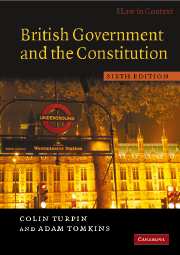Book contents
- Frontmatter
- Contents
- Preface
- Acknowledgements
- Abbreviations
- Table of Cases
- Table of Statutes
- Table of European Treaties
- Part I Constitution, state and beyond
- 1 The British constitutional order
- 2 The ideas of the constitution
- 3 Constitutional sources
- 4 Devolution and the structure of the United Kingdom
- 5 The European dimensions
- Part II Government
- Part III Accountability
- Part IV Liberty
- Index
4 - Devolution and the structure of the United Kingdom
Published online by Cambridge University Press: 05 June 2012
- Frontmatter
- Contents
- Preface
- Acknowledgements
- Abbreviations
- Table of Cases
- Table of Statutes
- Table of European Treaties
- Part I Constitution, state and beyond
- 1 The British constitutional order
- 2 The ideas of the constitution
- 3 Constitutional sources
- 4 Devolution and the structure of the United Kingdom
- 5 The European dimensions
- Part II Government
- Part III Accountability
- Part IV Liberty
- Index
Summary
The United Kingdom as a union state
The United Kingdom is a union of England, Scotland, Wales and Northern Ireland in a single state. The Channel Islands and the Isle of Man, which are internally self-governing dependencies of the Crown, are not part of the United Kingdom.
It used to be generally thought that the United Kingdom has a unitary constitution, like those of France, Italy, Japan, the Netherlands, Sweden, New Zealand and South Africa, and unlike the federal constitutions of Germany (‘The Federal Republic of Germany’), Switzerland, the United States, Australia, Brazil, Canada, India, Nigeria and the Russian Federation. However, it may be that the better view is that the United Kingdom has a union constitution, that is neither straightforwardly unitary nor systematically federal in character (see Walker, ‘Beyond the unitary conception of the United Kingdom constitution’ [2000] PL 384). This, perhaps, is particularly true since the advent of the current devolution arrangements in 1998. That said, however, it should not be thought that all such differences as exist in the government and public law of England, Scotland, Wales and Northern Ireland were created by devolution. A number of differences between English and Welsh law, on the one hand, and Scots law, on the other, are several centuries old. Others, while more recent in origin, nonetheless have nothing to do with devolution.
- Type
- Chapter
- Information
- British Government and the ConstitutionText and Materials, pp. 180 - 263Publisher: Cambridge University PressPrint publication year: 2007



